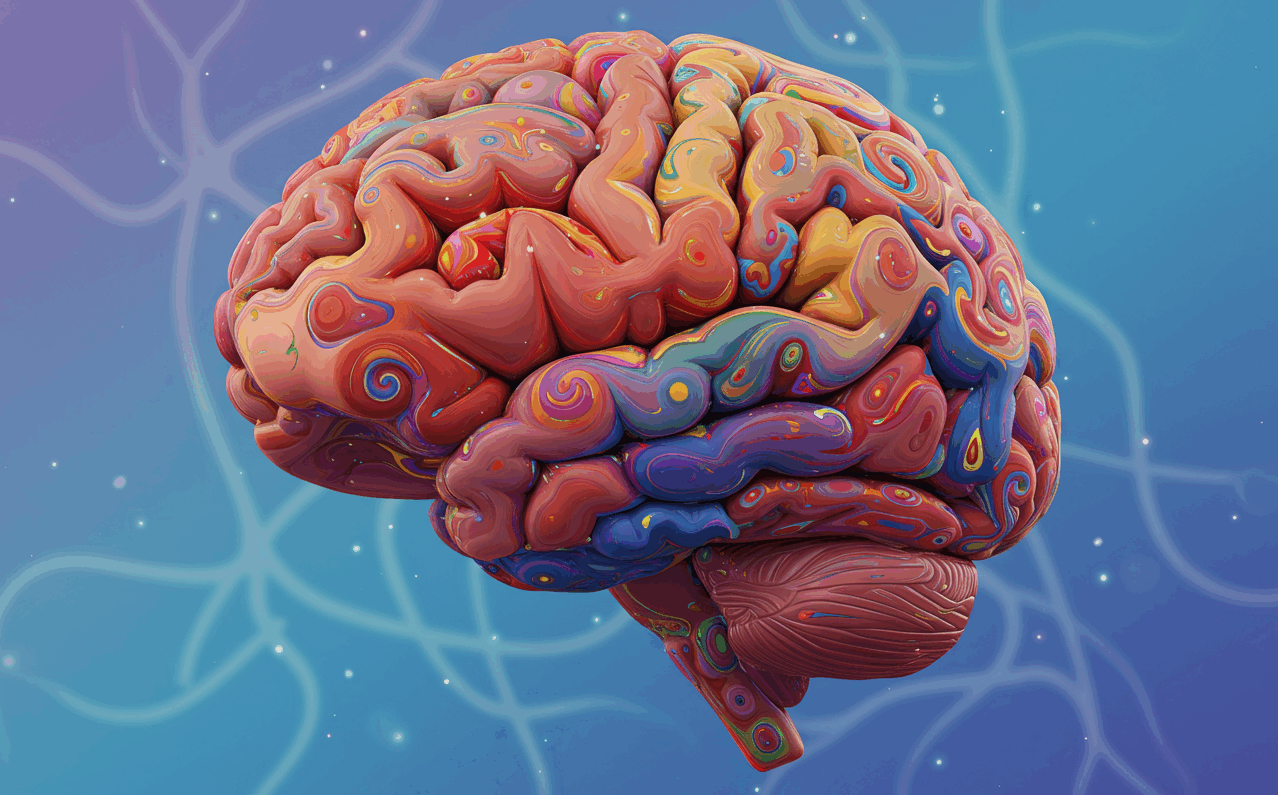All of us who have been diagnosed in late adulthood/late life experience an overwhelming amount of emotions that are very similar to the 5 stages of grief. But to explain this a little more, I wanted to share what my specific brain variant of ADHD, hypersensitivity and autism does to me and how it has changed my behavior, communication and overall life.
Let me start by debunking the most common statement, “We all have a little bit of ADHD. No, we don’t!
My brain lacks two hormones that are essential for executive functions that regulate concentration, impulse control, memory, and well-being: dopamine and epinephrine. Our brain works like a computer with 200 tabs open at the same time, which not only means that our brain jumps from one thing to the next without any rhyme or reason, but also that we are constantly at war with the environment because we are overwhelmed by sounds, smells, and sights; this is even more pronounced for me because I am also hypersensitive and on the autism spectrum. Stimuli become unbearable, I would feel like a rat in a cage, the brain starts racing and looking for an escape, resulting in me becoming agitated/aggressive when people say or do things that I feel are not right/negative, etc.
I have often compared my emotions to a freight train that, once started, could not be stopped or controlled. But how did it get to this point, why was I never diagnosed, and what were the consequences?
It is painful to read my report cards from school, apprenticeship and business school. Here are the statements, labels and judgments people have given me throughout my life:
- You are lazy. If you just tried a little harder, you could be the best/have excellent grades.
- You are combative
- You are too aggressive
- You are too loud
- You are a shit stirrer
- You have way too much empathy, which means you are neurotic
- You are disruptive
- You are intimidating/scary
- You are way too direct
- You need to learn to keep your mouth shut
- You are distracted and need to stop daydreaming
- You are not grounded in reality
- THERE IS SOMETHING WRONG WITH YOU!
- THERE IS SOMETHING WRONG WITH YOU!
I could probably go on with this list for a while, but these were the most common statements I’ve heard, the most painful ones, and also the ones that led to two hospitalizations after two complete mental breakdowns that left me unable to function and unwilling to live.
When I was a child, no one noticed that I was rarely present (in my mind) because things that really interested me would create hyper-focus, and having an endless curiosity about various topics allowed me to get really good grades in school in most subjects, which would make up for the not so good grades in subjects that couldn’t hold my attention or focus, like math, physics, and chemistry. However, I figured out “hacks” to always get by without failing classes, and I also knew that good grades would lead to success later in life.
I was also incredibly lucky to have a handful of teachers who saw my potential and recognized that I was ahead in certain subjects. But the real problems started as soon as I graduated from high school. I was 17 and starting an apprenticeship, and gradually my grades started to drop. I noticed an even bigger drop in concentration, lacked all impulse control and often “disrupted” the class with stupid remarks or singing! Too much stress and dysfunction in my personal life compounded my problems.
It all came to a head when my boss/teacher called me into her office and said that my outspokenness was refreshing but if she had 20 of me she’d shoot herself and told me to stop talking, start paying attention, work harder and stop being lazy. She also said that if I didn’t shape up, she might have to kick me out. I called my teacher and told him I didn’t know what was going on and he ended up calling her. I never really knew what he said to her, but after that she was very supportive and actively helped me graduate and get my diploma.
The thing is, having ADHD also means having RSD – Rejection Sensitive Dysphoria, a condition specifically attributed to the ADHD brain. For us, criticism and rejection cause severe emotional, mental, and sometimes even physical pain (hello, fibromyalgia). So we develop panic attacks, phobias and depression, which in turn are misinterpreted and misdiagnosed by doctors, friends, family and co-workers.
This is what it looks like. You know from a very early age that you are “not normal” and that there is something wrong with you, but you don’t know what it is. You feel that you do not fit in, so you begin to isolate yourself. Then rejection and criticism start raining down on you all the time. This not only emphasizes that something is wrong, but also that you are unlovable, that it is all your fault, that you need to try harder to fit in and behave normally because you are “just not right and other people can do it easily.
I had constant friction in my life because I had an extreme sense of right and wrong/fairness, as well as the all-or-nothing brain that would dictate either doing something or doing nothing at all. Where others were afraid to speak or do, I would fearlessly jump in front of the bus, no matter the consequences – but only for other people, not usually for myself.
By the age of 19, I had developed severe phobias and depression, attempted suicide, and engaged in self-destructive behavior. That was until I moved to the United States. There I learned to be a chameleon and began to imitate successful people, often asking them to mentor me. Every piece of advice I got, I took and applied without question. I also learned a million hacks to hide my “defective” brain.
Here are some of them:
- Never enter a meeting on a laptop or later on a cell phone
- When people speak to me/at me, turn away from the screen, stop what you are doing, and look only at their face
- Make to-do lists
- Always put things in the same place/develop designated places for everything
- Don’t go to parties or clubs with other people so you can leave if things get too much
- Never show sadness, anger/frustration, fear, anxiety or that you are overwhelmed
- Pretend to be an extrovert
- TRY TO KEEP YOUR MOUTH SHUT
My life was an endless series of rituals, rules and hacks and a constant censoring of myself while living with the fear and anxiety of making mistakes or opening my mouth inappropriately again. My life was hell, often unbearable, while I felt I was walking on the edge of an abyss and one wrong step would spell disaster. I was put on most of the antidepressants in existence, none of them worked. I was put on Alprazolam/Xanax for the constant anxiety attacks and sleeping pills for the never ending insomnia. I went to the emergency room countless times because I would break out in hives, have bizarre dizzy spells or horrible headaches and vomit until I had no choice but to go to the hospital. Nothing was ever found except a spike in blood pressure, sometimes an infection, but usually nothing that made me feel crazy. Of course, anxiety and panic attacks are not so easy to diagnose.
In 2006, the first real break came after shoulder surgery and severe stress in my personal life (again) that required hospitalization in the open ward of a psychiatric unit in the same hospital that had just repaired my shoulder. My brain was spinning, I couldn’t stop crying, I didn’t want to live anymore and all I could think was “I can’t do it anymore. I have no more strength. I’m so tired, so very tired.” I trusted my family doctor and he had the care and compassion to admit me to the hospital.
I was immediately put on a number of medications. There was Paxil for the depression, Ambien/Zolpidem for sleep, Xanax as needed for anxiety, and a drug I had never heard of, Adderall, to give me a little more energy and stop the suicidal thoughts.
When I left the hospital, for the first and only time in my life, my head was absolutely calm. I was able to listen to people, I had very little or nothing to say, and I felt at peace. Of course, when I stopped the medication, I also stopped the peace in my head.
*It is important for me to say here that I have never attempted suicide again and would never attempt it because my hypersensitivity would never allow me to hurt my loved ones by ending my life.
The next nearly two decades were filled with ups, mostly downs, and a steadily diminishing ability to self-regulate and censor. The safe haven of working for a large corporation that inadvertently used my neurodivergence to bring out the best in me was blown away by the market crash of 2008 and my forever trying to fit into the very neurotypical world of corporate America at various companies – and failing miserably. There was a steady stream of bad and impulsive decisions I made and the consequences that would eat away at my physical, mental and emotional health. And then came perimenopause! See my post about ADHD and menopause.

